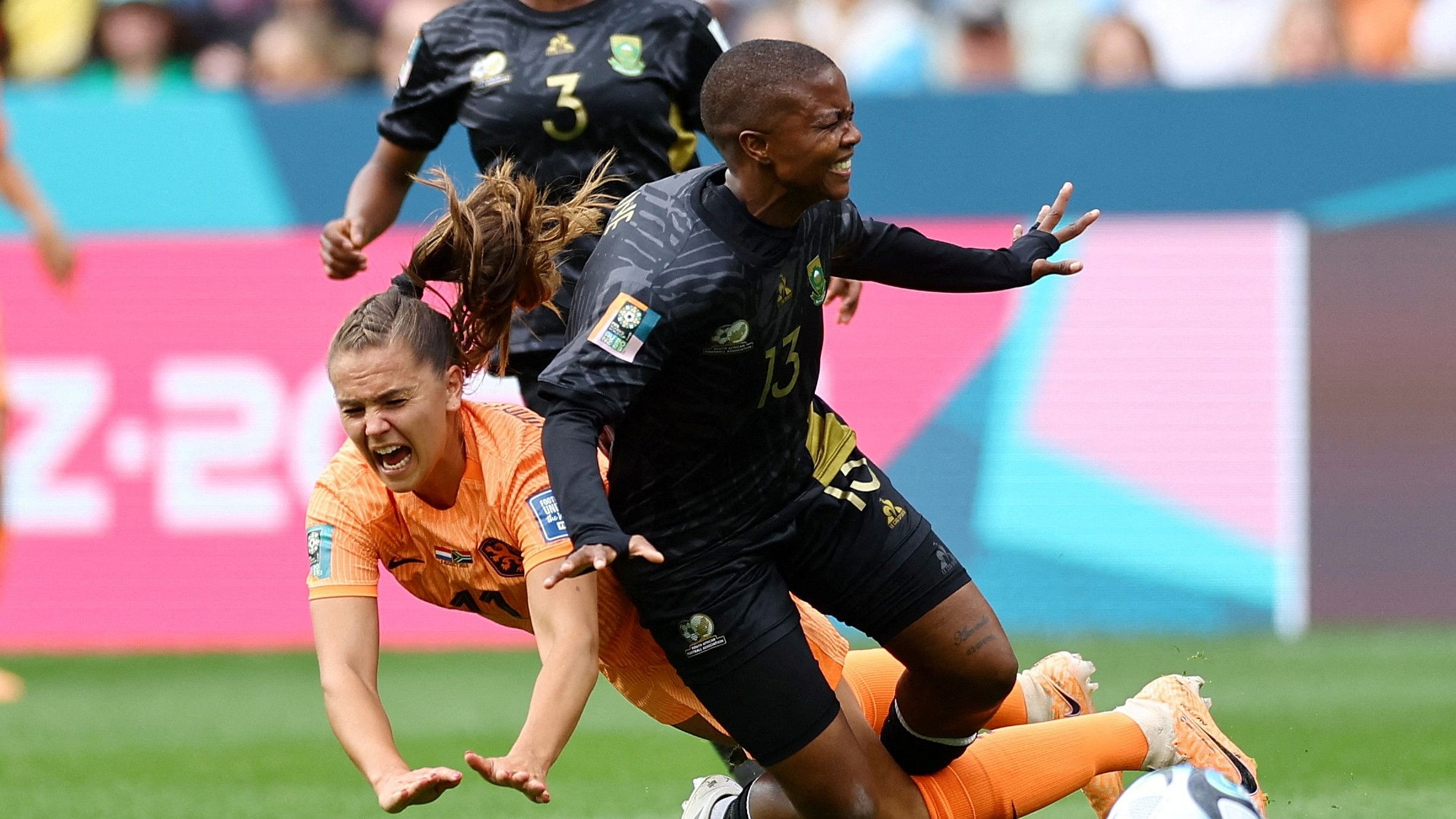
Credit: Reuters Photo
Thembi Kgatlana had time to pull off one more trick, to take one more shot, to send one more jolt of electricity through the crowd. She had been running, by that stage, for roughly 100 minutes, mounting what appeared at times to be a fearsome, one-woman campaign to keep South Africa in the World Cup for as long as possible.
By that stage, even she would have conceded that it was over. The Netherlands had a two-goal lead, and somewhere in the region of 30 seconds to survive. But Kgatlana, as she had already amply proved in this tournament, does not believe in stopping.
And so she picked up the ball, midway inside the Dutch half, and set out to “cause havoc,” as she put it, once more. First, she spun and writhed and twisted away from a defender, leaving her sprawled on the turf.
Then, her line of sight momentarily clear, she lined up to shoot from 25 yards. Stefanie van der Gragt stepped in the way of the shot. It caught her square in the face. The ball’s altered trajectory might have taken it anywhere. This time, it slithered just wide of Daphne van Domselaar’s goal.
It was that sort of game for South Africa, the kind of occasion when any number of things might have gone ever so slightly differently and a whole other world might have opened up. The Netherlands, in the end, went through with a 2-0 win to the quarterfinals, where Spain lies in wait in Wellington, New Zealand.
From the raw facts of the game, it might be tempting to assume that conclusion was inevitable from the moment Jill Roord, a yard from goal, gently nudged the Dutch ahead after just nine minutes. Largely thanks to Kgatlana, though, it did not feel like that in the slightest.
At times, particularly in the first half, she had seemed to take the idea of South Africa’s elimination as a personal affront. She took the fight to the Dutch almost single-handedly, wresting control of the game, becoming its central character, tormenting the defenders tasked with marking her, testing van Domselaar again and again and again.
Kgatlana had already left an indelible mark on the tournament — and on South African soccer, for that matter — with the last-gasp goal that had defeated Italy and brought Desiree Ellis’ South Africa team here, to a first knockout game in the country’s soccer history. The circumstances in which she had done so, in the midst of intense personal grief, had made it not just a World Cup underdog story, but a parable of the power of enduring determination.
She was not, then, likely to go quietly. She might, had things only been marginally, fractionally, microscopically different, have scored two or three or four in the opening phase of the game. Once, she rushed her finish. Once, the ball did not quite fall exactly when she might have liked. Twice, van Domselaar shot out a leg just at the right time. “The chances we created should have put us out of sight,” Ellis said.
At no point, though, could the Dutch relax: Kgatlana was always there, on the shoulder of one central defender or another, lurking, waiting, and then bursting through, panic following in her wake. “They did not know how to deal with us,” she said. “The game plan they had at the start did not work. They had to sit down and think about how to change so they could handle us.”
Even after Lineth Beerensteyn doubled the Netherlands’ lead, her speculative effort squirming from Kaylin Swart’s grasp, the goalkeeper’s head bowing and heart breaking as she turned to see it bobble over the line, there was no rest, no quarter.
The South Africans had only had three days’ rest to prepare for this game — including travel from New Zealand, something that Kgatlana felt cost the team — but even as the lactic acid rose and the legs started to ache, they kept coming. The only thing that could stop Kgatlana, it turned out, was the final whistle.
At that moment, the Dutch players lifted their arms in jubilation and, in no small measure, relief. Their hopes ended and their lungs emptied, some of their South African counterparts sank to their knees. Kgatlana did not. She stayed standing, congratulating her opponents, commiserating her teammates.
She was disappointed, of course, but she was proud, too. Not just of how South Africa had played here, and of the test they had posed the Dutch — “If they believed they are better than us, we had to make them prove it on the field; we did that,” she said — but of all they had achieved over the last three weeks, too. South Africa’s stay might be over. But it has shown, in its time here, that there is no doubt where it belongs.